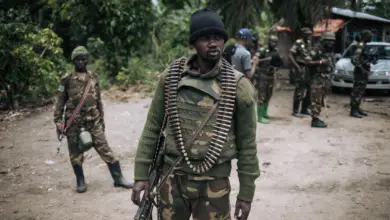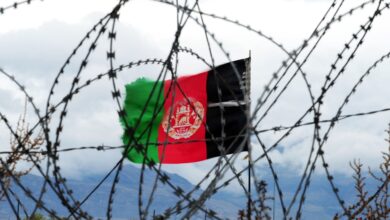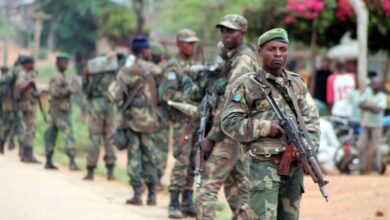Insurgents on Tuesday, August 27 shot dead 11 construction workers in northeast Nigeria, a militia leader and resident told AFP.
They said Islamic State West Africa Province fighters fired on the workers as they were laying fiber optic telecom cables in Wajirko village, which AFP placed around 150 km (93 miles) from Borno state capital Maiduguri.
“The insurgents came in the morning and opened fire on the workers, killing 11 and injuring many,” militia leader Mustapha Karimbe told AFP.
He said the victims were locals contracted as casual laborers by a telecom firm.
“The attackers had warned the laborers to stop working on laying the cables but they ignored the warning because they needed money to feed their families,” Karimbe said from the town of Biu, around 50 km away.
Those injured were taken to a hospital in the town of Damboa, he said.
The militants “came around” on three separate occasions and warned the men to stop the work which the group saw as a threat, said resident Bukar Maduye.
“Our people are starving and the laying of the cables provides some of us a good source of income which was why we ignored the warning,” said Maduye, who gave the same toll.
ISIS has not yet claimed that ISWAP fighters were responsible.
If confirmed, the killing of the construction workers could be ISWAP’s first such attack on civilians and it was unclear if it was an isolated case or a shift in tactics. ISWAP largely focuses on attacking military and government targets, but Nigerian officials and others increasingly frequently blame insurgent attacks on ISWAP rather than the rival Boko Haram group.
Chief of Army Staff Lieutenant General Tukur Yusuf Buratai in May said Boko Haram was defeated and the Nigerian military is now fighting what he reportedly described as an international criminal gang known as Islamic State West Africa Province, and the presidency in July said Boko Haram was defeated and that Nigeria is now facing remnants of the group, criminals, Islam in Maghreb and West African terrorists.
ISWAP fighters have carried out several attacks targeting Nigerian troops in the wider area, although it is also close to the Sambisa forest, the major stronghold of Boko Haram.
In April, militants looted and burnt a military base in Wajirko, after fierce fighting with soldiers who were forced to withdraw, according to AFP. Since then, troops have abandoned the base and the village was left without protection save snap military patrols which are prone to insurgent attacks. In June, three soldiers were killed in an ISWAP ambush while on patrol near the village.
ISWAP has attacked a number of military locations in the Maiduguri-Biu-Damuturu triangle in recent months. In late July, ISIS claimed ISWAP fighters killed 25 Nigerian troops in Benisheikh and earlier that month claimed ISWAP fighters fought off a Nigerian military assault in the Damboa area.
The Nigerian military seldom comments on the ongoing counter-insurgency operations, and tends to downplay the insurgents’ effectiveness, rarely acknowledging engagements and seemingly understating military casualties and equipment losses.
In one case, after ISWAP fighters attacked a Nigerian military base in Sabon Gari near Biu on April 26, the army described reporting on the incident as “unsubstantiated” and “fake,” saying it was the handiwork of “Boko Haram sympathizers.”
A month later on May 24, ISWAP fighters ambushed a convoy that was transporting civilians from Sabon Gari to Damboa. Media reported that between five and 25 Nigerian soldiers died in that attack, but again the Nigerian Army described those reports as “fake news” and denied there had been any attacks on military personnel in Borno state.
The jihadist group known as Boko Haram began its bloody insurgency in northeastern Nigeria in 2009, but it has since spread into neighboring Niger, Chad and Cameroon, prompting a regional military response.
Boko Haram split into two factions in mid-2016. One, led by long-time leader Abubakar Shekau, is notorious for suicide bombings and indiscriminate killings of civilians. Shekau pledged allegiance to ISIS leader Abu Bakr Al-Baghdadi in March 2015, but ISIS central only gives formal backing to the other faction, which it calls Islamic State West Africa Province.
The U.S. assesses that Boko Haram and ISWAP have been responsible for more than 35,000 deaths since 2011. More than two million others have been displaced, sparking a dire humanitarian crisis in the region.
With reporting from AFP












